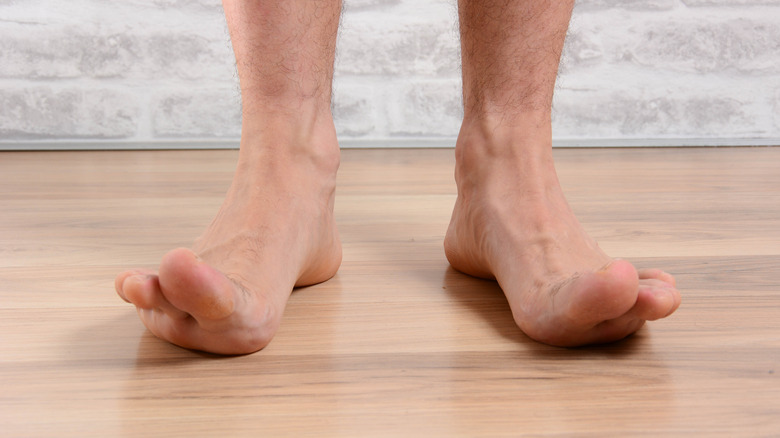Physical Signs That Might Mean Someone Is Lying To You
Do you ever get the sense that things are not as they seem? That the person in front of you, who seems so convincing, is saying something that feels a little fishy? Pretty much all of us know the feeling of finding out you've been lied to, or the feeling of telling someone a fib and praying they don't find out. In fact, lying is frighteningly common. In a study conducted by the University of Massachusetts, discussed via Science Daily, it was found that over the course of a 10-minute conversation, 60% of people would lie at least once.
Yet while some of us can craft a sentence so convincing that even Sherlock Holmes would have trouble finding a hole in it, our bodies might be telling a different story. "The body can't lie," states Traci Brown, a body-language and persuasion expert and author of "Persuasion Point" and "How to Detect Lies, Fraud and Identity Theft," to Meetings and Conventions. There are a number of involuntary physical signs that we give off when we lie, and getting familiar with the body language of lying is the first step in figuring out when you've been duped. Let's take a look at some of the telltale signs.
They start breathing a little more deeply
If the person telling you a story that seems a little too farfetched starts to deepen their breathing, it might be a fib. According to Lillian Glass, behavioral analyst and author of "The Body Language of Liars," this is a result of physical changes caused by lying. She tells the Independent, "In essence, they are out of breath because their heart rate and blood flow change." She adds, "Your body experiences these types of changes when you're nervous and feeling tense — when you lie."
These physical changes are part of the body's stress response when it anticipates harmful situations and reacts accordingly, quickening the heartbeat, raising blood pressure, and causing faster breath, according to WebMD. These are some of the physical responses that a polygraph, or lie detector machine, measures to try to determine if people are telling the truth (via the American Psychological Association). It's worth pointing out that the scientific community generally agrees there's no evidence that polygraph machines are actually valid and reliable — but if you see someone suddenly needing deep breaths for seemingly no reason at all, it could be a tell.
They reveal a "micro-expression" for an instant
Someone's expression changes for an instant. It was so quick you weren't even sure that you saw it correctly. What was that about? Apparently, through it's "micro-expressions," the face can reveal the true emotion underneath a lie. According to research conducted at Dalhousie University by Stephen Porter's forensic psychology lab (per Science Daily), liars' true emotions will often briefly flash through. "The face and its musculature are so complex — so much more complex than anywhere else in our external bodies," states Leanne ten Brinke, a graduate student in experimental psychology who collaborated on the research, to NBC News. As a result, no matter how much you're trying to portray an emotion, the muscles in your face just won't activate unless you're actually feeling it. And as the lie goes on, "the facial expression appears to crack and another emotion leaks on the face, however briefly," says ten Brinke. What should you do if this happens? Get your sleuth on, says ten Brinke. "You've got to probe with questions to find out why the person is feeling this way."
Their hands might be saying a little too much
Sometimes, your hands can talk as much as your words do. While hand gestures can bring a story to life, if it feels like someone's using their hands in an illogical way, it could be a sign that what they're saying is untrue. When we lie, "the mind is doing too many things including making up the story, figuring out if they're being believed and adding to the story accordingly," says body-language and persuasion expert Traci Brown to Time. As a result, hand gesturing "that might normally happen just before a statement happens after the statement."
The hands can also give other subtle clues that lies are being told if someone's facing their palms away from you. According to Brown, this can indicate someone's being dishonest or holding back information. Hiding the hands, by placing them inside the pockets or putting them under the table when speaking, can be another sign that someone's not telling the whole truth.
How balanced do they seem?
If you're noticing that the person you're talking to seems a little off-kilter, this could be a clear sign that they're not being totally honest with you. "Shifting or rocking can indicate that someone is feeling off-balance. They could even be standing on one foot or putting significantly more weight on one foot, so they're asymmetrical," says Patti Wood, body language expert and author of multiple books on body language, including "SNAP – Making the Most of First Impressions, Body Language, and Charisma," to Insider. As Wood goes on to explain, off-balance posture or irregular movements can be literal representations of the different sides of the brain not being in harmony with each other. "Asymmetry is a dissonance between the right and left hemisphere, so public speakers will do this all the time when they don't know what they're talking about or if they're lying."
They might start to sweat
Did that person just walk away from your conversation looking a little clammier? It might not just be down to the weather. An increased amount of sweating can be sign of lying, says Mark Bouton, an FBI agent for 30 years and author of "How to Spot Lies Like the FBI," to Business Insider. This is down to a stress response occurring in our autonomic nervous system (via MSD Manual), the system which regulates the amount we sweat. Th autonomic nervous system also controls our heart rate, blood pressure, and how quickly we breathe — all signs that a polygraph (or lie-detector) test looks out for changes in, according to research published in Federal Practitioner. As Bouton says, sweat appearing on the forehead, back of the neck, and/or cheeks can be a telltale giveaway of a fib — particularly if it's not that hot out. The autonomic nervous system response can also cause our palms to sweat, as MSD Manual points out.
They're having a little trouble with their words
Hang on, could you repeat that real quick? In most situations in life, we can speak without thinking too much — but not when we lie, according to Prevention. That's why it's important to pay attention to exactly how someone tells their story if you think they're lying. Hesitations, big pauses, or responses that are overly long can be a big sign that they're making it up as they go along. In addition, keep an ear on the type of language they're using. Ambiguity of language is a big giveaway of lying, and not something people usually do when they're being truthful, according to Clea Wright Whelan, a psychology lecturer for the University of Chester in the UK, whose work looks specifically at investigative interviewing and deceptive behavior. Whelan tells Prevention that "people who are telling the truth tend to sound more involved, immediate, and certain, and that liars tend to use language that's open to multiple interpretations."
Their complexion might change
The amount of blood in someone's face can tell a thousand tales. If someone starts to blush after they've spoken, despite not having said anything embarrassing, they may have just told a tall tale (via Business Insider). This can be attributed to the release of adrenaline that occurs when we lie or are under stress says FBI agent Mark Bouton. The stress response moves blood away from our organs and toward our muscles, which can give the skin a pink or red tinge (via Better Help).
However, the opposite can also happen. As body language expert Lillian Glass tells Time, for some people, lying can cause an involuntary response of blood rushing away from their face. Because of this, it's important to remember that knowing a person's baseline behaviors is important to help you figure out if they're lying, as different responses can mean different things depending on the person.
Their non-dominant hand might start doing the talking
Your buddy's right-handed, but all of a sudden, their left hand is very active during the conversation you're having. You'll need a keen eye for this one, but it could be a sure sign that they're lying. "Our bodies want to be honest, however, our words are what others hear," says Tonya Reiman, body language expert and author of "The Power of Body Language," to Insider. She adds, "to challenge that, our bodies will try to leak the deception out. Look for the signals of strong words with the non-dominant hand."
Wow. Thanks for giving the game away, body. According to Reiman, this detail was key in deciphering a big lies of our time: Bill Clinton's famous affair with Monica Lewinsky. Reiman notes that during his testimony on the subject, the left-handed former president "emphatically lifted his right hand and arm, stating, 'I did not have sexual relations with that woman.' This might have been believable, but he used his non-dominant hand when attempting to be emphatic."
They seem a little too still
If the person you're speaking to seems unnervingly still, it could be wise to question why — they might be holding back the truth, and showing it through their (lack of) body language. When you speak and engage in normal conversation, it is natural to move your body around in subtle, relaxed, and, for the most part, unconscious movements," says behavioral analyst Lillian Glass to Business Insider. When someone you're talking to isn't doing this, though, "this may be a sign of the primitive neurological 'fight' rather than the 'flight' response, as the body positions and readies itself for possible confrontation," according to Glass.
One of the symptoms of the fight or flight response — which is caused by a rush of hormones released in reaction to a perceived threat — is muscle tension, as the body primes itself to fight (per Verywell Mind). When someone's lying, then, they may unconsciously lock up in preparation for conflict. Therefore, as Glass tells Business Insider, "if you observe a rigid, catatonic stance devoid of movement, it is often a huge warning sign that something is off."
They can't stop touching their face
Why do that person's hands keep going to their lips or cheeks while they're talking? It could be a sign that they're trying to keep down stressful feelings as they lie to you (via NBC News). According to Roger Strecker, Sr., a trained behavioral analysis interviewer and interrogator with over 30 years of law enforcement experience, lying stresses the body and mind, and as a response, people may sometimes touch their face more than they normally would. This facial touching has a pacifying effect, causing the release of calming hormones like dopamine, serotonin, and oxytocin, according to Joe Navarro, FBI Counterintelligence agent, body language expert, and author of "What Every Body is Saying," per Psychology Today. Oxytocin in particular has been shown to be released through skin-to-skin contact and stroking motions (like, for example, someone rubbing their cheek as they lie) by research published in Frontiers in Psychology.
As Navarro states, the reason we touch our faces in particular to soothe is down to its abundance of highly sensitive nerve endings. Our hands move reflexively to these more sensitive areas, which through the trigeminal nerve and the facial nerve are directly connected to the brain (via Teach Me Anatomy). The proximity of these areas to the brain means the hormonal response — and the calming effect — occurs faster.
They're blinking a little bit more than usual
Blinking is so subtle that we rarely notice it, either in ourselves or others. If you start to notice someone's eyelids doing overtime, though, it's a good sign they're lying. "A person will ordinarily blink about five or six times a minute, or once every 10 or 12 seconds," states FBI agent Mark Bouton to Business Insider. But when people experience stress –as they potentially do when they're telling a lie — "he may blink five or six times in rapid succession," says Bouton.
Scientific research appears to corroborate that our blinking patterns change when we're lying, though in an interesting way. A study published in the Journal of Nonverbal Behavior looked at blinking behavior both during and after a lie was told. Because blinking decreases when cognitive load is higher (like when our brain's doing mental gymnastics to tell a watertight fib), it was observed that blinking decreased when people were telling the lie itself, but increased afterward as a kind of compensatory effect. However, as Bouton points out, everyone blinks at a different rate, so just because someone blinks more when they're talking to you doesn't mean it's a surefire sign they're lying. It could just be their natural state.
They might get a little fidgety
If someone's moving around a little more than they normally would, there could be a reason to doubt what they're saying. Fidgeting is commonly cited as a sign of lying, and research conducted by academics from the University of Cambridge and Utrecht University found that around three-quarters of people displayed fidgety movements when they lied. The researchers suggested that this involuntary movement is down to the increase in fear and nervous energy we feel when we tell a lie. Fidgeting and other self-adaptor behaviors occur as a symptom of this heightened energy.
So where to look for fidgeting? Try the feet, says body-language and persuasion expert Traci Brown to Good Housekeeping. "We have the least control over our feet," states Brown, and this means that liars can end up moving them involuntarily without realizing, resulting in a rocking motion in their body if they're standing up, or bouncing or tapping feet if they're sitting down. Liars might also fuss over or twiddle their hair, as UCLA professor of psychology R. Edward Geiselman and his team found in a study on lying behaviors (discussed via Science Daily).
Their voice starts to change
It's not just what people say that gives away a lie, but quite literally how they're saying it. Changes in the voice can indicate that someone's lying, according to Susan Constantine, body language expert and author of "The Complete Idiot's Guide to Reading Body Language," who spoke to Prevention. When someone's voice deviates from their natural flow and intonation, getting louder and faster, it could be a sign of anxiety that indicates a lie is being told, Constantine says. This is also the case if their voice gets higher in pitch, as stress and anxiety results in tension around the voice box (as discussed via Science Daily), leading to voice changes. Interestingly, the opposite may also occur, says Constantine. When someone's lying, their voice might become lower, quieter, and more conspiratorial, as the voice responds instinctively to something that we know we shouldn't be saying.
Their eye contact is unnaturally steady
One of the first things we look for when we think someone's lying is avoidance of gaze. When people aren't making eye contact, they're lying, right? It turns out the opposite might be true, and that liars will more often hold eye contact for too long (via the Independent). According to behavioral analyst Lillian Glass, this can be seen in some of the biggest liars out there: "[Bernie] Madoff, like most con men, overcompensated and stared at people longer than usual, often without blinking at regular intervals," Glass told the Independent. "When people tell the truth, most will occasionally shift their eyes around and may even look away from time to time. Liars, on the other hand, will use a cold, steady gaze to intimidate and control."
Why do liars do this? It's all to do with the commonly held notion that liars avoid eye contact. From a young age, we learn to play on the belief that liars won't look you in the eye by overcompensating, states Jack Schafer, a behavioral analyst for the FBI (via Psychology Today).














